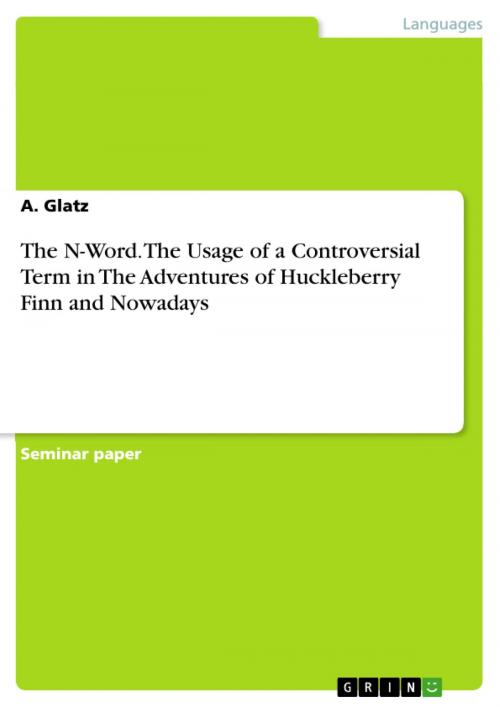The N-Word. The Usage of a Controversial Term in The Adventures of Huckleberry Finn and Nowadays
Fiction & Literature, Literary Theory & Criticism, British| Author: | A. Glatz | ISBN: | 9783640879670 |
| Publisher: | GRIN Publishing | Publication: | March 29, 2011 |
| Imprint: | GRIN Publishing | Language: | English |
| Author: | A. Glatz |
| ISBN: | 9783640879670 |
| Publisher: | GRIN Publishing |
| Publication: | March 29, 2011 |
| Imprint: | GRIN Publishing |
| Language: | English |
Seminar paper from the year 2009 in the subject English - Literature, Works, grade: 3,0, Justus-Liebig-University Giessen (Anglistik), language: English, abstract: Usage of the N-Word in Huck Finn. I will first examine how the N-Word was used in general in former times, then how Mark Twain used it in Huck Finn and finally why he employed it so often. Before I begin I would like to say that I am going to use the word nigger a lot of times in this paper. I do not want to insult anybody, but I have to mention it sometimes as I write about the term. I also dissociate myself from some quotations you will read on the following pages, where the word is used in an offensive way. Former Usage of the N-Word and that in Huck Finn At the beginning, I would like to quote Thomas Jefferson, who claimed that '...their [the blacks'] existence appears to participate more of sensation than reflection' . At the time of 'the Enlightenment', a human being was characterized by reason. This was underlined by the philosopher Descartes who stated 'cogito ergo sum' ('I think therefore I am'). In the quote by Jefferson, the black community is considered as a people who does not think, but rather feels. It implies that blacks lack the most important feature of a human being, which is reason, and therefore cannot be considered as 'human'. Before the Civil Rights Movement in the 1960s, this argument was a very common legitimation for slavery and for the use of nigger to refer to African Americans. The term itself was, for instance, used to distinguish a white and a black person with the same first name. When you say 'Nigger Jim' it is evident that you mean a black slave, and not the white Jim. In addition to that, blacks were never addressed by 'Mr.' or 'Mrs.', but rather by their first name or by 'Auntie' or 'Uncle'. Another interesting point is the fact that whites who supported blacks during the Civil Rights Movement were referred to as niggerlovers. In this example you can see that even whites were discriminated by simply having contact or feeling sympathy with African Americans. Now I would like to focus on the novel Huck Finn by Mark Twain. As it was written before the abolition of slavery, this book might be helpful to examine how the N-Word was used. Beside the question of 'how', the 'why' also plays an important role. What were Twain's reasons for using this insult? Was he a racist as many people claim? In Huck Finn, the N-Word can first be read in chapter 2: 'Miss Watson's big nigger' , by which her slave Jim is meant. We can assume that in this case, nigger is used as a synonym for slave.
Seminar paper from the year 2009 in the subject English - Literature, Works, grade: 3,0, Justus-Liebig-University Giessen (Anglistik), language: English, abstract: Usage of the N-Word in Huck Finn. I will first examine how the N-Word was used in general in former times, then how Mark Twain used it in Huck Finn and finally why he employed it so often. Before I begin I would like to say that I am going to use the word nigger a lot of times in this paper. I do not want to insult anybody, but I have to mention it sometimes as I write about the term. I also dissociate myself from some quotations you will read on the following pages, where the word is used in an offensive way. Former Usage of the N-Word and that in Huck Finn At the beginning, I would like to quote Thomas Jefferson, who claimed that '...their [the blacks'] existence appears to participate more of sensation than reflection' . At the time of 'the Enlightenment', a human being was characterized by reason. This was underlined by the philosopher Descartes who stated 'cogito ergo sum' ('I think therefore I am'). In the quote by Jefferson, the black community is considered as a people who does not think, but rather feels. It implies that blacks lack the most important feature of a human being, which is reason, and therefore cannot be considered as 'human'. Before the Civil Rights Movement in the 1960s, this argument was a very common legitimation for slavery and for the use of nigger to refer to African Americans. The term itself was, for instance, used to distinguish a white and a black person with the same first name. When you say 'Nigger Jim' it is evident that you mean a black slave, and not the white Jim. In addition to that, blacks were never addressed by 'Mr.' or 'Mrs.', but rather by their first name or by 'Auntie' or 'Uncle'. Another interesting point is the fact that whites who supported blacks during the Civil Rights Movement were referred to as niggerlovers. In this example you can see that even whites were discriminated by simply having contact or feeling sympathy with African Americans. Now I would like to focus on the novel Huck Finn by Mark Twain. As it was written before the abolition of slavery, this book might be helpful to examine how the N-Word was used. Beside the question of 'how', the 'why' also plays an important role. What were Twain's reasons for using this insult? Was he a racist as many people claim? In Huck Finn, the N-Word can first be read in chapter 2: 'Miss Watson's big nigger' , by which her slave Jim is meant. We can assume that in this case, nigger is used as a synonym for slave.















